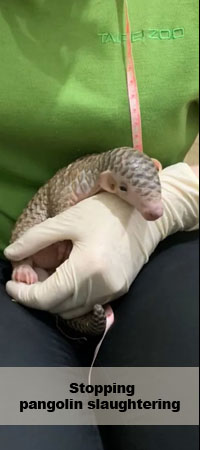|
The pangolins crisis continues and could be to spiral out of control. As of today, the illegal pangolin scale trade is widespread in China and that pharmaceutical shops and hospitals are both contributors. Consequently, pangolins are still the most trafficked mammal despite some protections gain in the last few years. In China and Vietnam, the appetite for pangolin continues and Africa has become now a key source. Eight species are extant, four in Asia and four in Africa. The pangolin is a medium sized, nocturnal, and elusive mammal that is covered in scales. Pangolin scales are made of keratin, the same material that makes up fingernails, hair, and horn. Its various body parts, especially their scales, but also its fetuses, blood, bones and claws are believed to have healing properties in traditional medicines. However, pangolin scales, like rhino horn, have no proven medicinal value.
For decades the solitary and defenseless pangolin has been being hunted and slaughtered at a rate that defies its own survival. The white-bellied pangolin is now the most traded species in Africa, with pricing of $4–15 per individual in 2023. In 2019, a record year, more than 128,000 tons of pangolin parts were intercepted, including two shipments from Nigeria to Singapore containing 28.2 tons of parts from 70,000 pangolins. In 2021, at least 23.5 tons of pangolins and their parts were trafficked. All signs including ESI field observations in Africa and part of southeast Asia suggest that pangolin numbers are falling off a cliff. Millions are being killed and without actions on the ground, these creatures will not survive.
Endangered Species International (ESI) has clear and achievable solutions to protect pangolins. Taiwan is a striking example that succeeded in protecting and recovering its pangolin populations. Pangolin hunting is banned across Taiwan, except for a small population of Indigenous Taiwanese. Years ago, before stopping the hunt for pangolins, they were found only in several locations but today they are back, even in the coastal forest areas or grasslands and wetlands. Stopping hunting in the field at its sources works and ESI passionately applies this strategy in Africa and Southeast Asia.
Consequently, we must intensify and create new field patrols to stop pangolin massacre in Africa and southeast Asia. Just $100 could help buy the patrol boots, GPS, surveillance cameras, and paid part of the salaries needed to get one more ranger into the field. Our rangers can patrol known pangolin critical habitat day-in, day-out and stop the poaching at its source. They can conduct surveillance at the bushmeat markets and at every village deep in the forest. ESI could increase the number of patrols and ultimately stop the illegal trade like we have done successfully in the past with gorillas. We have the experience and presence in the field to stop illegal trade where it starts! Please support us today to stop the pangolin slaughtering.

|











